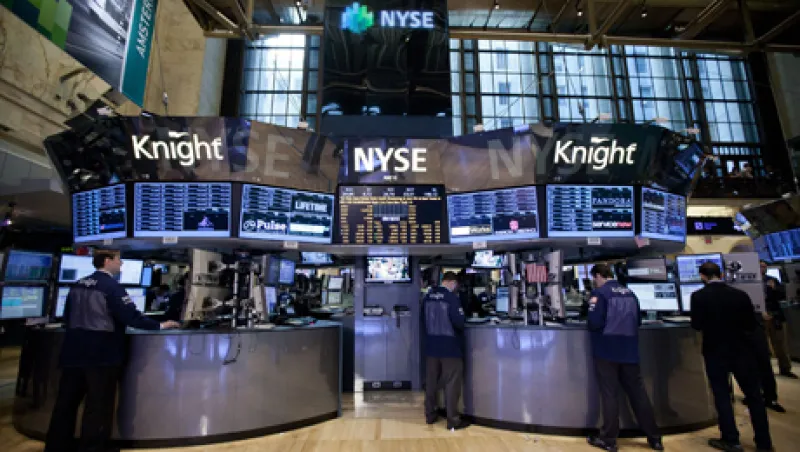Spurred by the growing complexity of global equity markets, buy-side investors are finding smarter ways to access liquidity and protect their anonymity in the markets. They’re getting help from some unlikely service providers, including high frequency trading firms and hedge funds.
In June 2011, Chicago-based automated trading firm Getco became one of the first electronic market makers to create custom-designed trade execution algorithms for investors. Since then Chicago hedge fund giant Citadel has introduced new trading algorithms for the buy side, which has long relied on execution services from traditional banks and broker-dealers.
The result is a gradual democratization of some of the fastest, most powerful trade execution tools for equity markets. Even traditional asset managers are taking note. “I think it is an incredibly interesting industry proposition,” says Tony Whalley, head of derivatives and equity dealing for Edinburgh-based Scottish Widows Investment Partnership, which manages £142 billion ($221 billion). “Although we haven’t actually worked with any of these providers yet, we recently met with Getco to talk about using its algorithm.”
It’s easy to see why investors might want such algorithms. Over the past decade U.S. and European equity market liquidity has fragmented across many trading venues. Total trading volumes are down — but systemic market risks are running high. On August 1, for example, Jersey City, New Jersey–based Knight Capital Group, an independent market maker, experienced a major software glitch that caused Knight’s trading systems to erroneously amass large positions in dozens of NYSE-listed stocks. When the dust cleared, the company had run up losses of $440 million and had to be bailed out by a consortium of its peers, including Jefferies Group, which initiated and structured the deal, as well as Blackstone Group, Getco, Stephens, Stifel Financial Corp. and TD Ameritrade Holding Corp. Online retail brokerage company Scottrade Financial Services also reportedly joined the consortium and took a stake in Knight.
Gven the potential for market disruption, asset managers and other institutions are now taking increasing pains to protect themselves from such adverse events by trading more nimbly with new, high-speed tools. Although nearly all major banks and broker-dealers provide trade-routing software and algorithmic trading services to help buy-side clients execute large or sensitive trades in relative safety, Scottish Widows’ Whalley frets about what he calls the hidden agendas that may shape broker-dealers’ routing decisions. Among them: incentives to collect rebates for posting liquidity on certain platforms and exchanges. He also worries that banks may seek to internalize clients’ order flow, matching orders through their own electronic crossing networks, or dark pools, to capture fees.
“We need a trade execution tool that is guaranteed to be much more neutral in distributing our orders,” Whalley says. “We want to get a better crack of the whip.”
The core value of Getco’s product is the firm’s expertise in navigating market microstructure and its ability to source liquidity in a way that is difficult for other algorithms to detect because it mimics the market making of a high frequency trading shop. Getco has traditionally used this skill in electronic market making to benefit its proprietary trading systems, but four years ago it created its own dark pool and began offering execution services to external clients. Since then it has introduced a customized trade-order router and added GETAlpha, a suite of U.S.-equity-trading algorithms, to the mix.
This year Citadel began offering a suite of buy-side trading algorithms, designed to help investors access lit and dark markets, under its new Mercury label.
The competition to design the best suite of trading algorithms is fierce. Credit Suisse and Goldman Sachs Group have large, healthy trade execution services and provide powerful algorithms to the buy side. But the new challengers aren’t backing off. “We are so closely focused on microexecutions and finding liquidity, we felt that we could take all of the liquidity provision that we do for the proprietary side, port it over and offer it up to external clients,” says Michael Blum, head of Getco Execution Services. Although GETAlpha may not provide the best solution for trade execution in every circumstance, for asset managers who can afford to be patient, it’s innovative and cost-efficient.
Dmitry Rakhlin, New York–based global head of quantitative trading at $400 billion asset manager AllianceBernstein, helped design a customized trade execution platform whose options include Getco’s GETAlpha, but he doesn’t view it as a cure-all in the search for top-tier liquidity in fragmented markets. “We do use high frequency trading algorithms as one of the tools in our arsenal, but we do it with calculation and control,” Rakhlin says. “We monitor their execution quality very closely, and — so far — we are very pleased with the results. But these algorithms are currently good at solving a rather narrow task, namely passive execution within Getco’s own dark pool and on the exchanges.”
Given the huge volume of trading now executed off-exchange, asset managers can’t afford to ignore dark pools. In July, 31.37 percent of consolidated U.S. equity trading volume took place away from public markets, according to New York–based agency brokerage Rosenblatt Securities. But that doesn’t mean investors want to be limited to using dark pools in an effort to avoid having block trades picked off; they want safe passage through public exchanges too. Now, with help from a few ambitious trading firms, even the largest institutions may be able to tread more lightly and cover their tracks. • •






